14 KiB
Building a RAG-Based Memory Storage MCP Server in Python
Introduction
In this tutorial, we'll demonstrate how to build a simple RAG (Retrieval-Augmented Generation) based long-term memory storage MCP server using Python, and debug it using the openmcp plugin. Once implemented, we'll be able to store, retrieve, and manage our memories through natural language interactions with large language models, without needing to write any specific query code.
1. Setup
The project structure is as follows:
📦rag_memo_mcp
┣ 📂memory_db/ # LanceDB database files, created during initialization
┣ 📜server.py # MCP server implementation
┣ 📜pyproject.toml # Project configuration file
┣ 📜uv.lock # uv lockfile
┗ ...
First, let's prepare the runtime environment. This project recommends using uv. (uv is a blazingly fast Python package manager that's beloved by those who use it. Of course, if you're a loyal fan of pip or other package managers, that works perfectly fine too.)
# First download uv (Windows)
powershell -ExecutionPolicy ByPass -c "irm https://astral.sh/uv/install.ps1 | iex"
# Or (macOS/Linux)
# curl -LsSf https://astral.sh/uv/install.sh | sh
# Project initialization
uv init rag_memo_mcp
cd rag_memo_mcp
# We recommend creating a virtual environment
uv venv
# Activate virtual environment (Windows)
.venv\Scripts\activate
# Or (macOS/Linux)
# source .venv/bin/activate
# Install dependencies
uv add "mcp[cli]" lancedb pandas sentence-transformers
2. Understanding the Service Implementation
Unlike traditional databases that require pre-installation and configuration, this project's core MemoryStore uses LanceDB, a vector database that automatically creates and initializes itself in the memory_db directory when the server first starts, requiring no additional configuration.
Let's dive into server.py to understand its implementation details.
2.1 MemoryStore Core Class
The MemoryStore class is the heart of memory storage and retrieval functionality.
class MemoryStore:
initialize(): This method handles initialization. It connects to the LanceDB database (creating it if it doesn't exist), defines the memory table schema, and by default loads theall-MiniLM-L6-v2model for generating vector embeddings from text content.
def __init__(self, db_path: str = "./memory_db"):
self.db_path = db_path
self.db = None
self.table = None
self.encoder = None
self._initialized = False
async def initialize(self):
if self._initialized:
return
self.encoder = SentenceTransformer("all-MiniLM-L6-v2")
self.db = lancedb.connect(self.db_path)
schema = pa.schema(
[
pa.field("id", pa.string()),
pa.field("content", pa.string()),
pa.field("summary", pa.string()),
pa.field("tags", pa.list_(pa.string())),
pa.field("timestamp", pa.timestamp("us")),
pa.field("category", pa.string()),
pa.field("importance", pa.int32()),
pa.field(
"vector", pa.list_(pa.float32(), 384)
),
]
)
try:
self.table = self.db.open_table("memories")
except Exception:
self.table = self.db.create_table("memories", schema=schema)
self._initialized = True
store_memory(): When storing a new memory, this method generates a unique ID and timestamp for the memory content. If no summary is provided, it automatically generates a simple summary, then uses the pre-loaded model to convert the content into a vector, and finally stores all information (ID, content, summary, tags, timestamp, category, importance, vector) in the LanceDB table.
async def store_memory(
self,
content: str,
summary: Optional[str] = None,
tags: Optional[List[str]] = None,
category: str = "general",
importance: int = 5,
) -> str:
await self.initialize()
memory_id = str(uuid.uuid4())
timestamp = datetime.now(timezone.utc)
if not summary:
summary = content[:100] + "..." if len(content) > 100 else content
embedding = self._generate_embedding(content)
data = [
{
"id": memory_id,
"content": content,
"summary": summary,
"tags": tags or [],
"timestamp": timestamp,
"category": category,
"importance": importance,
"vector": embedding,
}
]
self.table.add(data)
return memory_id
search_memories(): This is the key to implementing RAG. When a query is made, this method converts the query text into a vector as well, then performs vector similarity search in LanceDB to find the most relevant memories. It also supports filtering by category and importance.
async def search_memories(
self,
query: str,
limit: int = 10,
category: Optional[str] = None,
min_importance: Optional[int] = None,
) -> List[Dict[str, Any]]:
await self.initialize()
query_embedding = self._generate_embedding(query)
search_query = self.table.search(query_embedding)
if limit:
search_query = search_query.limit(limit)
filters = []
if category:
filters.append(f"category = '{category}'")
if min_importance is not None:
filters.append(f"importance >= {min_importance}")
if filters:
filter_str = " AND ".join(filters)
search_query = search_query.where(filter_str)
results = search_query.to_pandas()
memories = []
for _, row in results.iterrows():
memory = {
"id": row["id"],
"content": row["content"],
"summary": row["summary"],
"tags": row["tags"].tolist(),
"timestamp": row["timestamp"],
"category": row["category"],
"importance": int(row["importance"]),
"similarity_score": row.get(
"_distance", 0.0
),
}
memories.append(memory)
return memories
2.2 MCP Server and Tools
We use FastMCP to quickly build an MCP server and expose MemoryStore functionality as tools that large language models can call through the @mcp.tool() decorator.
store_memory: Take notes! Store a memory.search_memories: Let me think... Search for relevant memories based on query content.get_memory: Find by reference! Retrieve a specific memory by ID.list_categories: Organize by category! List all memory categories.get_memory_stats: Memory inventory! Get statistics about the memory store, such as total count, counts by category, etc.
# Initialize memory store
memory_store = MemoryStore()
# Create MCP server
mcp = FastMCP("RAG-based Memory MCP Server")
@mcp.tool()
async def store_memory(
content: str,
summary: Optional[str] = None,
tags: Optional[str] = None,
category: str = "general",
importance: int = 5,
) -> Dict[str, str]:
"""
Store content in memory.
Args:
content: The content to store
summary: Optional summary (auto-generated if not provided)
tags: Comma-separated tags
category: Memory category (default: general)
importance: Importance level 1-10 (default: 5)
"""
try:
# Parse tags if provided
tag_list = [tag.strip() for tag in tags.split(",")] if tags else []
memory_id = await memory_store.store_memory(
content=content,
summary=summary,
tags=tag_list,
category=category,
importance=importance,
)
return {
"status": "success",
"memory_id": memory_id,
"message": f"Memory stored successfully with ID: {memory_id}",
}
except Exception as e:
return {"status": "error", "message": f"Failed to store memory: {str(e)}"}
@mcp.tool()
async def search_memories(
query: str,
limit: int = 10,
category: Optional[str] = None,
min_importance: Optional[int] = None,
) -> Dict[str, Any]:
"""
Search stored memories using semantic similarity.
Args:
query: Search query
limit: Maximum number of results (default: 10)
category: Filter by category
min_importance: Minimum importance level
"""
try:
memories = await memory_store.search_memories(
query=query, limit=limit, category=category, min_importance=min_importance
)
return {
"status": "success",
"query": query,
"total_results": len(memories),
"memories": memories,
}
except Exception as e:
return {"status": "error", "message": f"Search failed: {str(e)}"}
@mcp.tool()
async def get_memory(memory_id: str) -> Dict[str, Any]:
"""
Retrieve a specific memory by its ID.
Args:
memory_id: The unique identifier of the memory
"""
try:
memory = await memory_store.get_memory_by_id(memory_id)
if memory:
return {"status": "success", "memory": memory}
else:
return {
"status": "error",
"message": f"Memory with ID {memory_id} not found",
}
except Exception as e:
return {"status": "error", "message": f"Failed to retrieve memory: {str(e)}"}
@mcp.tool()
async def list_categories() -> Dict[str, Any]:
try:
categories = await memory_store.list_categories()
return {"status": "success", "categories": categories}
except Exception as e:
return {"status": "error", "message": f"Failed to list categories: {str(e)}"}
@mcp.tool()
async def get_memory_stats() -> Dict[str, Any]:
try:
stats = await memory_store.get_stats()
return {"status": "success", "stats": stats}
except Exception as e:
return {"status": "error", "message": f"Failed to get stats: {str(e)}"}
The server startup code is at the end of server.py, which first initializes the MemoryStore, then runs the MCP server.
if __name__ == "__main__":
# Initialize memory store on startup
async def init_memory():
await memory_store.initialize()
# Run initialization
asyncio.run(init_memory())
# Run MCP server
mcp.run()
3. Debugging with openmcp
3.1 Adding Workspace Connection
Next, we'll debug using the openmcp plugin. First, let's test if we can connect successfully. Here we choose stdio, set the working path to the project directory, then click Connect. In the log panel on the right, we can see that we've successfully connected.
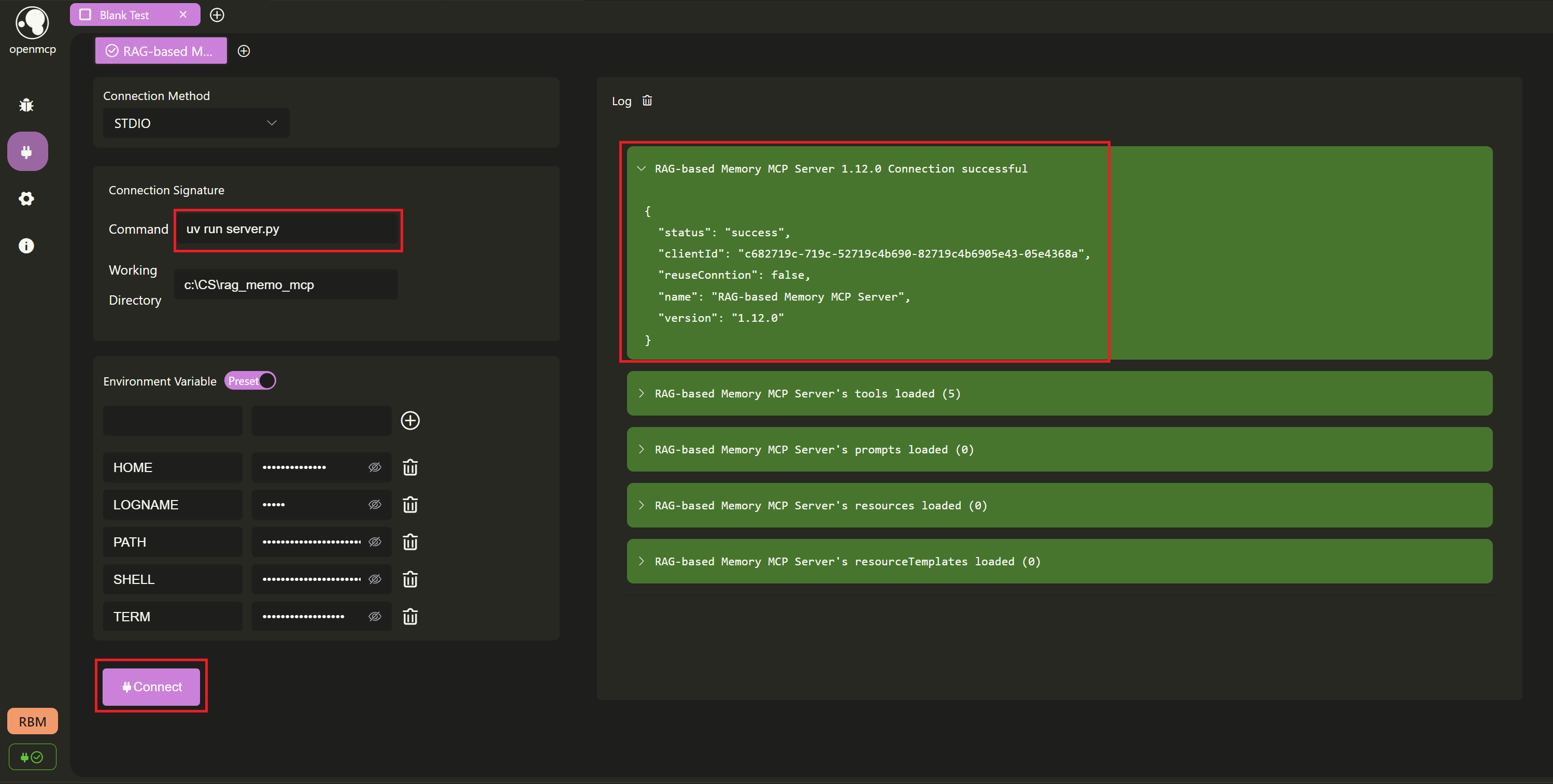
3.2 Testing Tools
After successful connection, let's test if the tools work properly.
-
Store a little secret: Create a new
Tooltab and select thestore_memorytool. For example, we input:content:Xiao Ming's birthday is 2025.6.18category:birthdayimportance:8
Click
Execute, and if successful, it will return the stored memory ID, such asbcc30f6c-979c-46d1-b34a-cd1a09242106
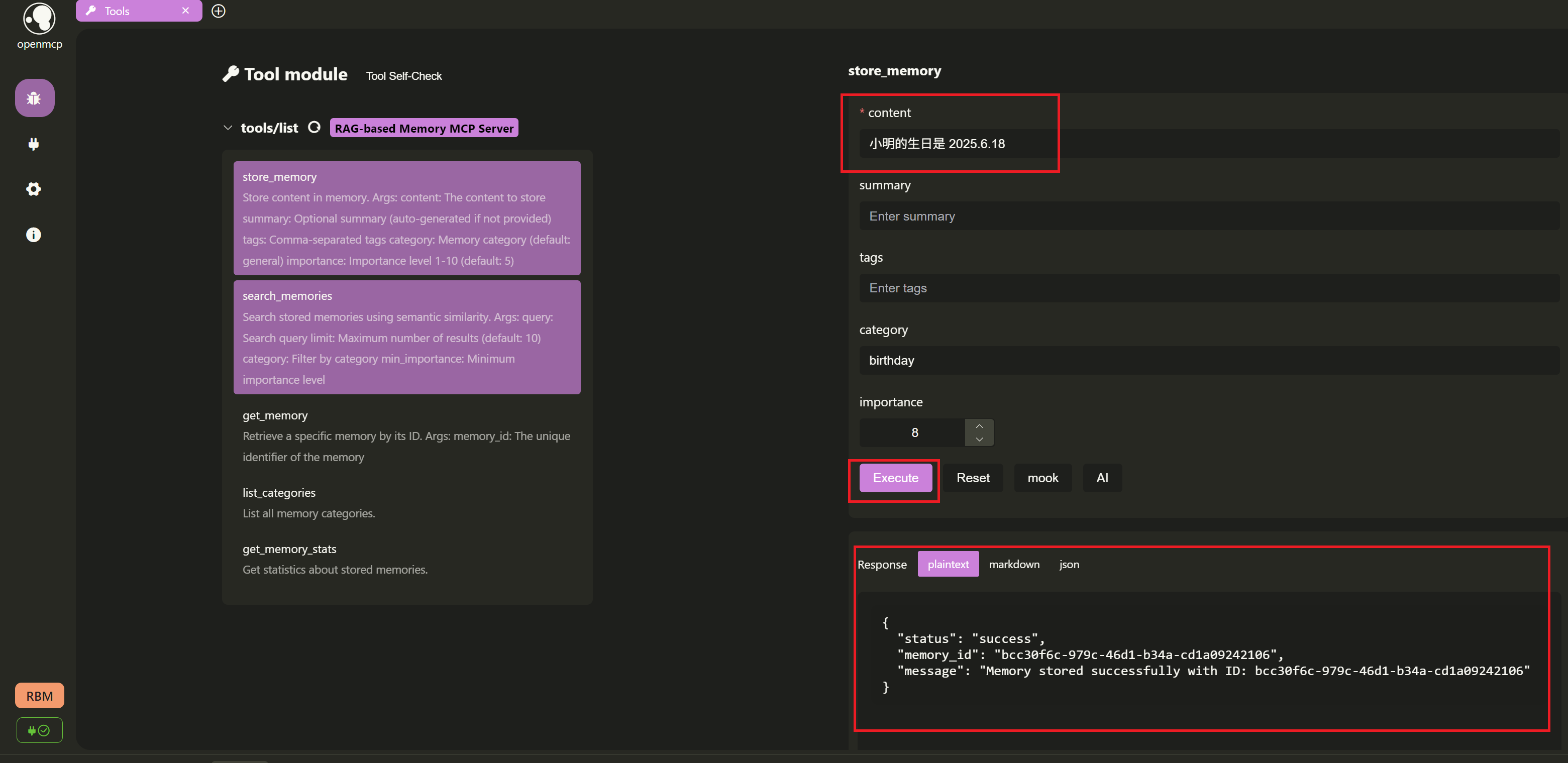
- Retrieve a specific memory by ID:
After successful storage, we use the returned memory ID
bcc30f6c-979c-46d1-b34a-cd1a09242106, select theget_memorytool, and test if we can retrieve it fromLanceDB.
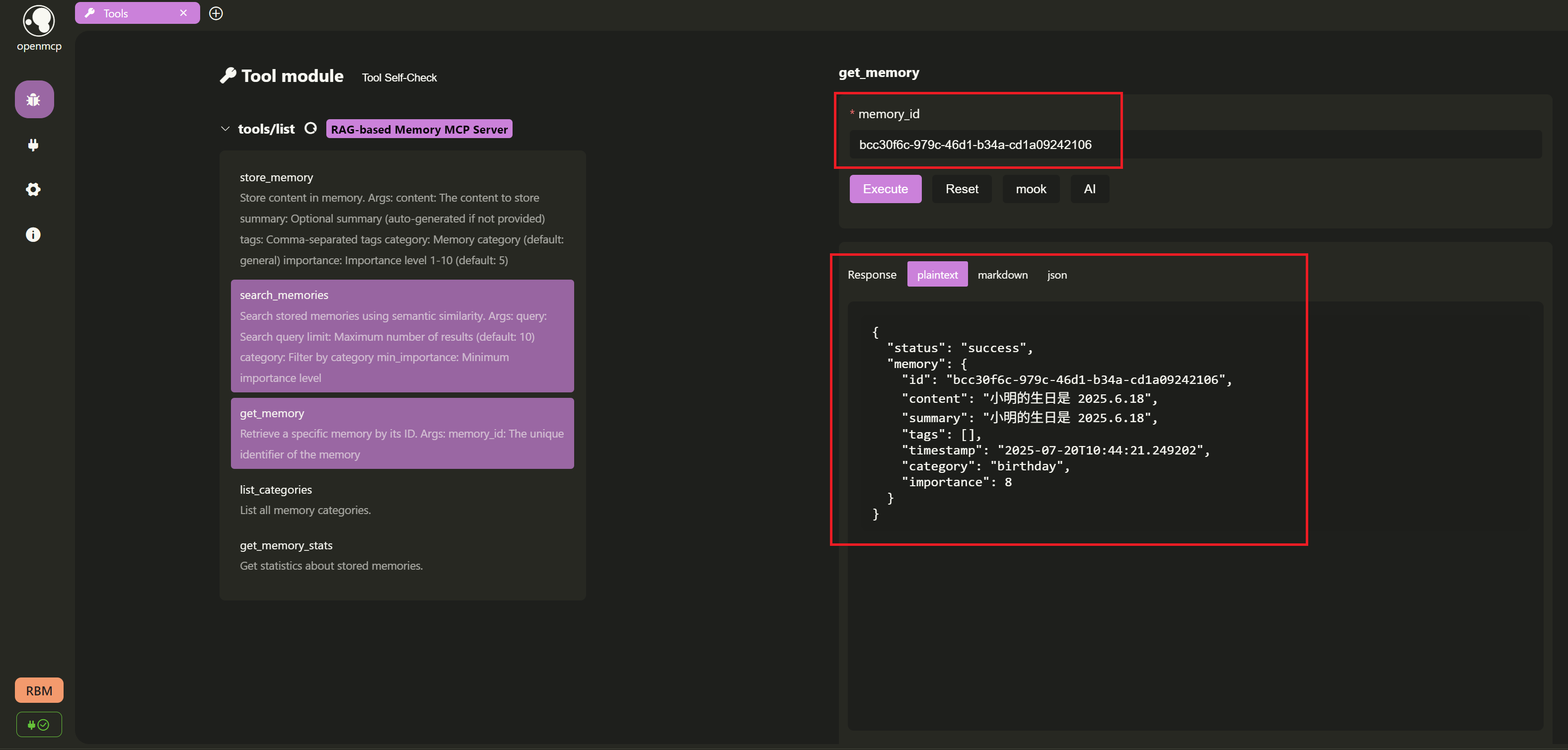
- List current memory categories:
We call the
list_categoriestool to view all current memory categories. Since we only added one memory with thebirthdaycategory, the result should only contain this category.
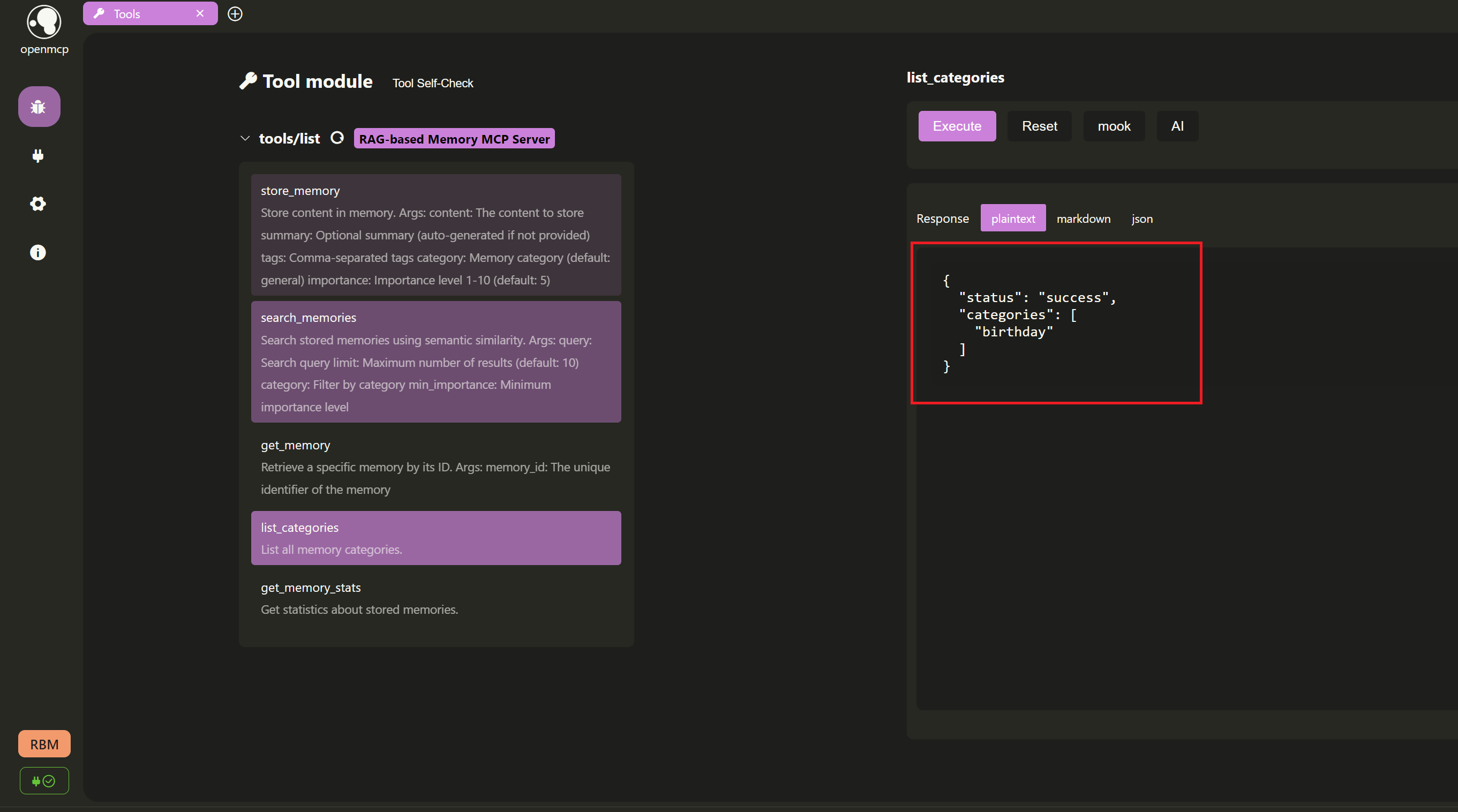
- Get memory statistics:
Next, we use the
get_memory_statstool to get statistical information about the memory store, such as the total number of memories and the count of memories in each category.
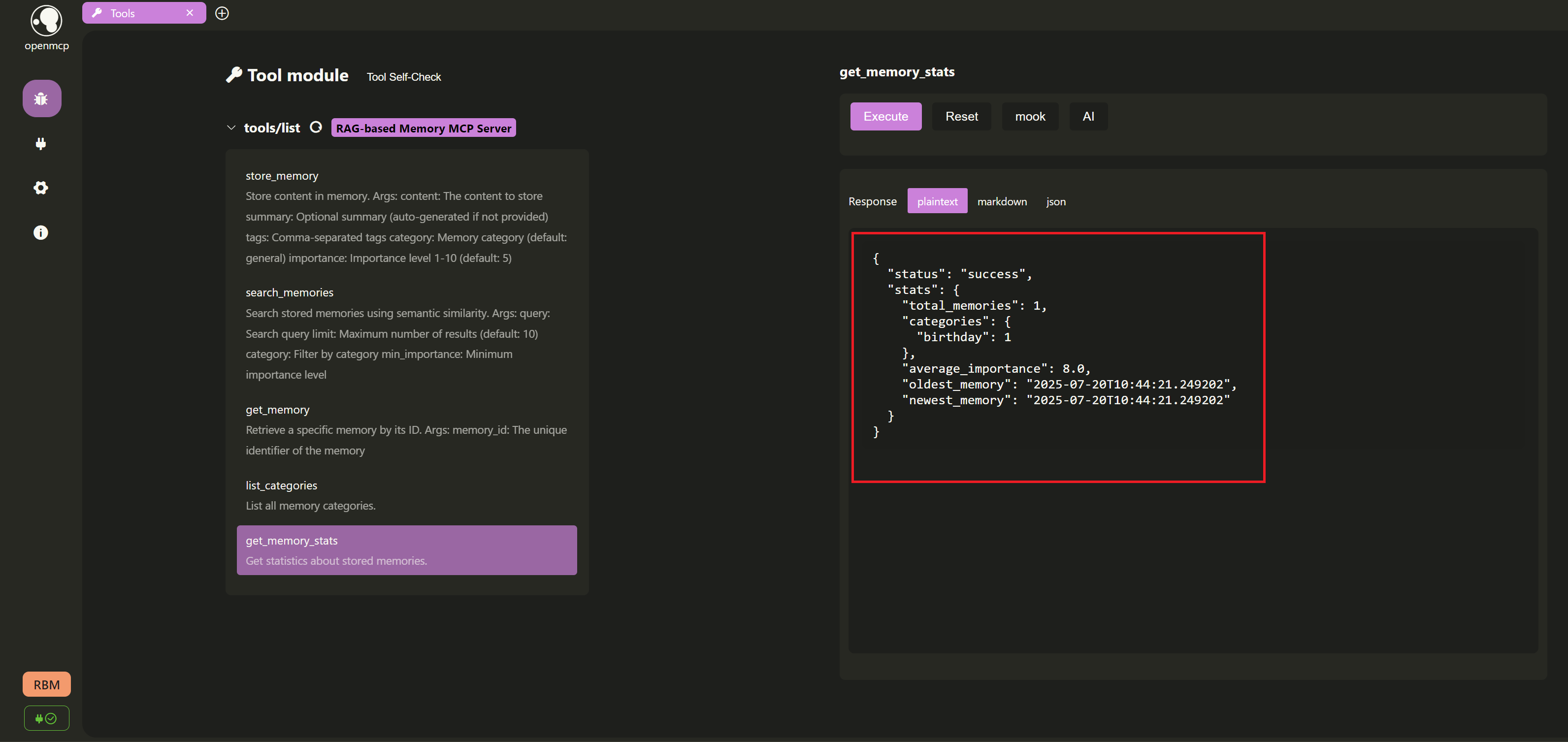
3.3 Large Language Model Interaction Testing
We intentionally "skipped" testing one tool search_memories above, saving it for the large language model interaction testing. Enter the interaction testing page (remember to set up the LLM's api_key and base_url first according to the Connect to LLM tutorial). We can first disable all other tools, keeping only the search_memories tool:
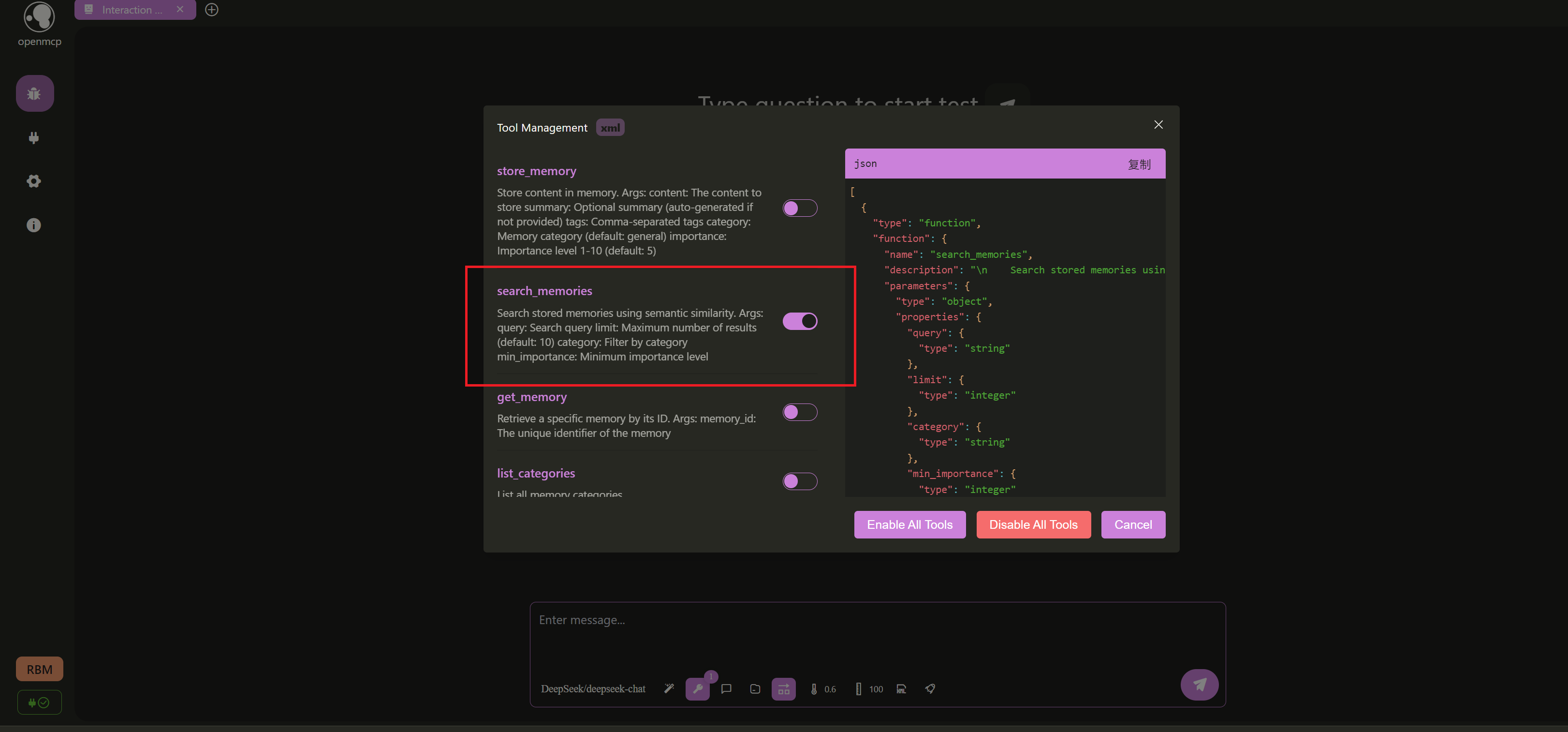
Then, we casually ask:
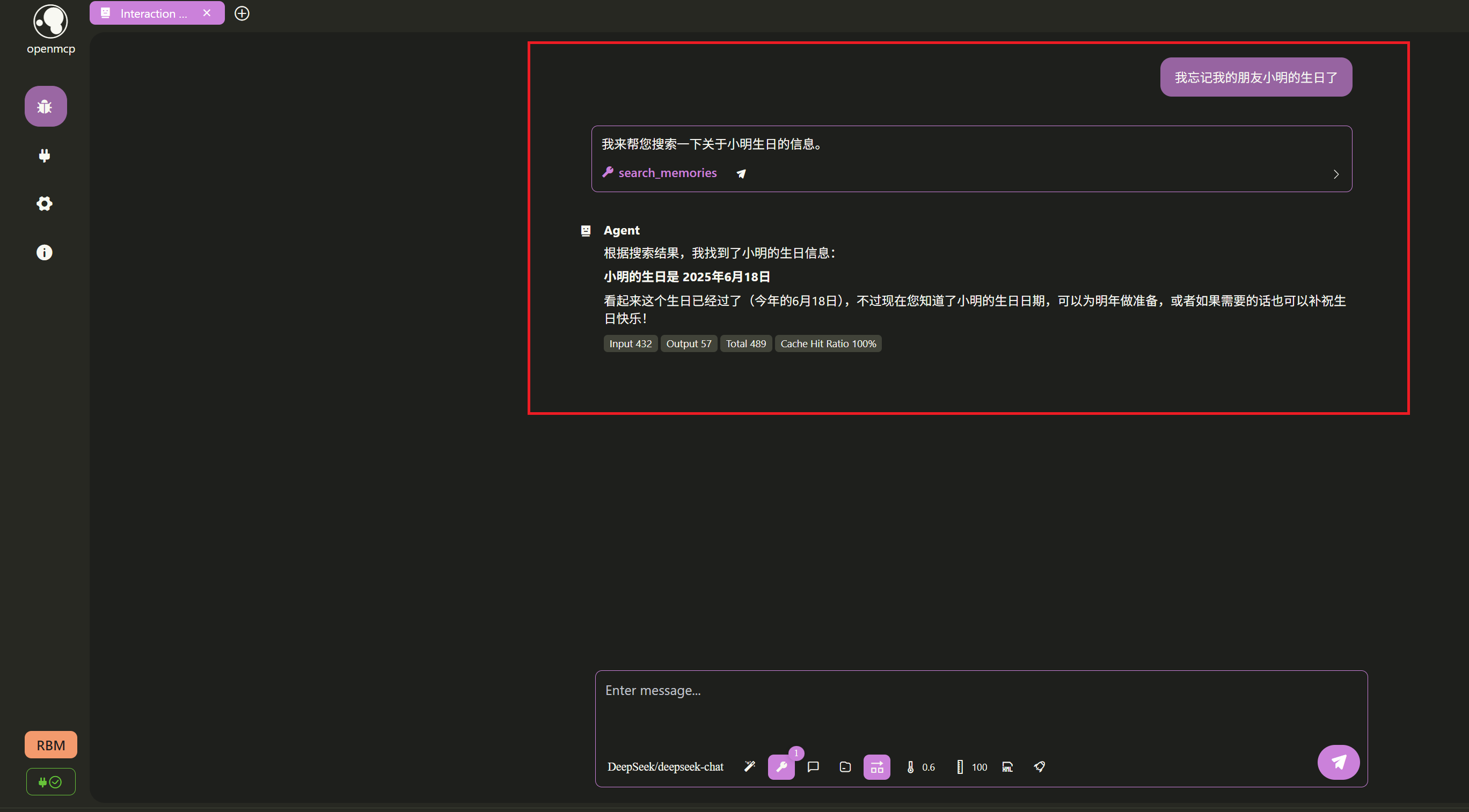
Great! The large language model successfully helped me recall my friend Xiao Ming's birthday. Cheers!